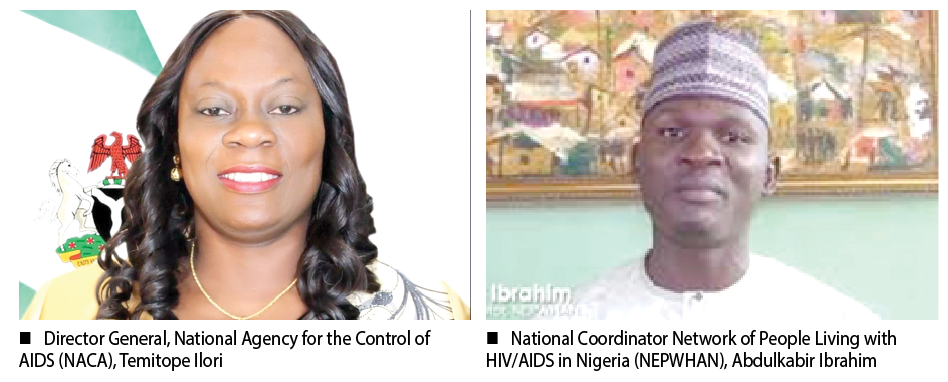Stopping HIV transmission among children in Nigeria is crucial to achieving the goal of ending AIDS as a public health threat by 2030.
However, six years to UNAIDS goal 2030, Nigeria has continued to record a high number of new HIV infections among children. Prevention of mother to child transmission (PMTCT) of HIV services is also still below targets.
The transmission of HIV from a HIV-positive mother to her child during pregnancy, labour, delivery or breastfeeding is called mother-to-child transmission. When children are born with HIV, they carry it to the next generation and the epidemic continues.
As the country joins the world to mark this year’s World AIDS Day, people living with HIV and experts have called for concerted and increased efforts towards bridging gaps in preventing mother-to-child transmission of HIV. This year’s commemoration is themed, “Take the Rights Path: Sustain HIV Response, Stop HIV among Children to End AIDS in Nigeria by 2030.”
Nigeria has an HIV prevalence of 1.4% among the general population 15-64 years with an estimated 2 million people living with HIV.
According to the Director General of the National Agency for the Control of AIDS (NACA), Dr Temitope Ilori, the country continues to face a significant challenge in preventing mother-to-child transmission of HIV.
She said Nigeria recorded 22,000 new infections, stating that despite Nigeria ‘s progress, “our Prevention of Mother-To-Child Transmission (PMTCT) of HIV and paediatric HIV coverage remain below 33%—well below the 95% target.”
Quoting the UNAIDS 2023 Report, the NACA Director General said approximately 160,000 children in Nigeria aged 0-14 are living with HIV with 15,000 AIDS-related deaths occurring each year.
She said, “Following comprehensive data analysis in 2021, we joined the international initiative and developed the Global Alliance Action Plan to End AIDS in Children. The plan is fully resourced, yet coverage continues to fall short.”
Experts and people living with HIV/ AIDS (PLWHA) said there is a need for increased HIV testing and treatment for pregnant women.
Women in communities still have challenges accessing antenatal care and health services at facilities. While efforts have been made to take services to communities, many pregnant women still remain unreached.
The National Secretary of the Network of People living with HIV/AIDS in Nigeria (NEPHWAN), Nicholas Ugbenyen, said HIV infection gaps among newborns stall the country’s efforts towards achieving the United Nations 95-95-95 strategy of ending the AIDS epidemic by 2030.
He explained that the strategy means that 95% of the people who are living with HIV know their HIV status, 95% of the people who know that they are living with HIV are on lifesaving antiretroviral treatment, and 95% of people who are on treatment are virally suppressed.
He said factors fuelling mother-to-child transmission of HIV in Nigeria are lack of awareness about HIV, PMTCT service availability, stigma and discrimination and accessibility and affordability of healthcare services.
He said others are cultural and social barriers, attitude of healthcare providers, inadequate healthcare infrastructure, limited antiretroviral therapy (ART) centres or comprehensive primary healthcare centres, transportation and logistical challenges, language barriers, fear of taking HIV test or receiving HIV-positive results as well as fear of partner violence in case of HIV status disclosure.
He explained that there are situations where due to lack of awareness, pregnant women visit traditional birth attendants (TBAs) and some other unconventional facilities, which do not provide comprehensive healthcare services instead of facilities where there are PMTCT services.
He said, “Secondly, poverty is also a factor because when the women go to public and private facilities, and are charged highly for services, they resort to the TBAs and unconventional places where they are charged little money for services. Many of these places don’t provide HIV tests or prevention services. So, it is a major factor fuelling the transmission of mother to child transmission of HIV in Nigeria.”
He said measures such as mentor mothers working in communities and covering unconventional sites are now helping to close gaps between unconventional and conventional sites.
He added that due to limited health facilities in the country, integration of comprehensive HIV services in primary healthcare facilities will help.
Ugbenyen who is also the Project Manager for Global Fund Nigeria TB/HIV Reach and Impact project (N-THRIP) said one of the components of the GF 7 N-THRIP Project is PMTCT.
He said, “We have volunteers, mentor mothers and other organizations who are working at the community, looking for pregnant women, whereby when they are found reactive, they are placed on treatment immediately before delivery. So, this is happening all over the country.”
Mrs Esther Hindi, National Coordinator for Association of Women Living with HIV/AIDS in Nigeria (ASWHAN), said there is a need to bridge the gaps to PMTCT, and to ensure that all women and children living with HIV are placed on treatment.
She said there is also a need for improved support and compressive care for pregnant women living with HIV, adding that treatment and care access is still at 50%.
She said doing so will help them achieve viral suppression and lower transmission risks.
She said, “As mothers living with HIV and AIDS this is our clarion call to ensure that we end mother to transmission of HIV in Nigeria, which is possible with our collective and joint efforts.”
A mother living with HIV, Christy Haruna, said her first child was born with HIV because she could not access antenatal care in the area where she lived. She said the transfer of her husband to their state capital thereafter helped her to access PMTCT services and she later gave birth to two other children without HIV.
She called for extension of PMTCT services to women in rural areas including remote areas.
“If there are no facilities available in the communities, they should take it to the pregnant women in their homes. It will help a lot. Stigma for pregnant positive women should also be reduced,” she said.
The Nigeria Country Coordinator of the US-funded President’s Emergency Plan for AIDS Relief (PEPFAR), Funmi Adesanya, narrated the story of Ada, a vibrant young mother who was diagnosed with HIV during pregnancy.
She said, “Overwhelmed with fear but she wasn’t alone as she had the support and guidance of mentor mothers and community health workers. Ada enroled in the PMTCT programme. Today not only is she thriving on treatment but her baby was also born HIV- free.”
The Country Representative for UNAIDS Nigeria, Dr Leo Zekeng, enjoined all stakeholders to prioritise the prevention of mother-to-child transmission and linking positive cases to treatment.
He said: “But as we celebrate, sustainability also means putting communities also in the leadership in terms of implementing, stopping babies born with HIV and AIDS, and having access to quality and affordable services.”
He said while significant progress has been made in treatment coverage and reducing new infections, the current response model is unsustainable.
Dr Tim Efuntoye, Prevention Branch Chief, US CDC Nigeria said congregational approach can help in preventing mother-to-child transmission of HIV.
He said a baby shower programme activated by USCDC in 126 congregations of its Baby Shower Programme across 13 states in Nigeria has had a positive impact.
He enjoined pregnant women to pay close attention to their health, attend antenatal sessions regularly and carry out all required tests, including for HIV.
The NACA DG said to address the gaps in preventing HIV among children, the Minister of State for Health recently established a national-level acceleration committee; to track implementation and has paid advocacy visits and inaugurated state committees in three (3) states engaging directly with 3 governors to support the launch and resourcing of a similar committee at the state level, ensuring that no child is born HIV positive in Nigeria. This will go around the 36 states and FCT in due course.
The NACA boss called on all Nigerians to join hands with NACA to break the stigma, embrace equity, drive collective action and stop HIV among our children.

 Join Daily Trust WhatsApp Community For Quick Access To News and Happenings Around You.
Join Daily Trust WhatsApp Community For Quick Access To News and Happenings Around You.


